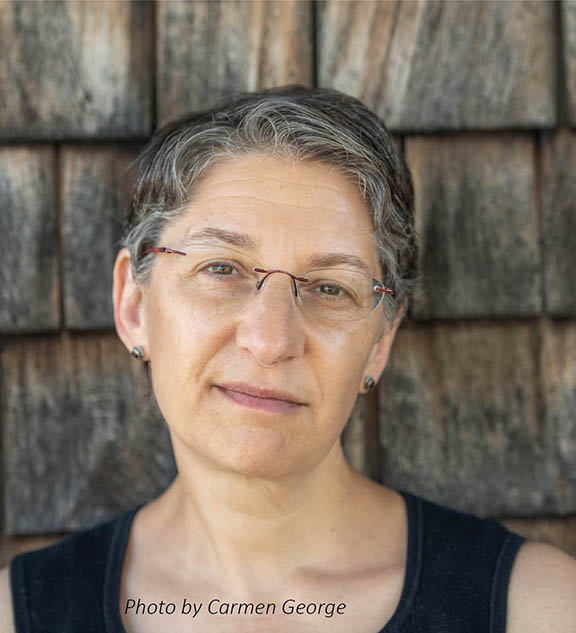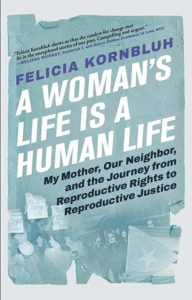
- This event has passed.
Book Discussion: A Woman’s Life Is A Human Life


A WOMAN’S LIFE IS A HUMAN LIFE
My Mother, Our Neighbor, and the Journey from Reproductive RIghts to Reproductive Justice
Written by Felicia Kornbluh ’84. In discussion with Allison Pugh ’84.
Wednesday, March 22
7:00-8:00pm ET
Virtual Program. Click to register.
Join us on Wednesday, March 22 from 7:00-8:00pm ET as the HCHSAA celebrates Women’s History Month in March. We invite you to attend a virtual discussion of Felicia Kornbluh’s compelling new book that illustrates the modern fight for reproductive rights. As the U.S. reckons with a post-Roe v. Wade reality, her book comes at a particularly important time in our nation’s history.
In A WOMAN’S LIFE IS A HUMAN LIFE: My Mother, Our Neighbor and the Journey from Reproductive Rights to Reproductive Justice (Grove Press 2023), Kornbluh details how sterilization abuse after World War Two limited reproductive rights just as much as criminal abortion laws limited them. She is the first to capture the history of the movement against sterilization abuse and its growth into today’s demands for Reproductive Justice.
Kornbluh has a personal connection with the history she chronicles in A WOMAN’S LIFE IS A HUMAN LIFE. Her mother, the late Beatrice Kornbluh Braun, a labor lawyer of Ruth Bader Ginsburg’s generation, wrote the first draft of the most liberal pre-Roe abortion law in the country. This was New York’s law, enacted in 1970, which made abortion legal through the 24th week of a pregnancy and for the first time opened access to all, no matter their state or country of residency.
Kornbluh also focuses on another remarkable woman: Puerto Rican pediatrician and public health leader Helen Rodríguez-Trías, who lived in the apartment across the hall from Kornbluh and her mother for nearly a decade. Dr. Rodríguez-Trías led the movement against sterilization abuse, a nearly forgotten branch of the reproductive rights movement that won its own astounding victories in New York and nationally.
Rich with firsthand accounts and previously unseen sources, A WOMAN’S LIFE IS A HUMAN LIFE tells the story of illegal abortion and the fight against it at the same time that it chronicles the history of sterilization abuse, which happened disproportionately to women of color, young women, and poor people. Kornbluh invites readers to see the fight against sterilization abuse as inseparable from the fight for safe, legal, affordable abortion care – and to understand how vital it is to fight for the right to bear and raise children, as well as the right to avoid childbearing if that is your choice. Anyone who cares about the fate of reproductive rights today can look to Kornbluh’s dynamic, surprising, and highly readable book for insight and hope.
Make sure to take part in this important discussion. Sign up today for the Zoom registration link!
About the Author
 Felicia Kornbluh is a Professor of History with a secondary appointment in Gender, Sexuality and Women’s Studies, and an affiliated faculty member in Jewish Studies, at the University of Vermont. She is the author of The Battle for Welfare Rights: Politics and Poverty in Modern America and coauthor, with Gwendolyn Mink, of Ensuring Poverty: Welfare Reform in Feminist Perspective. She has held fellowships from Princeton’s Program in Law and Public Affairs, the Schlesinger Library at Harvard-Radcliffe, the American Historical Association, and Institute for Gender, Sexuality and Feminist Studies at McGill University, the American Bar Foundation, and both New York University and UC-Berkeley Law Schools. She is a former board member of Planned Parenthood of Northern New England and current board vice president of the Planned Parenthood of Vermont Action Fund. She writes frequently for the scholarly and non-scholarly press, including for The New York Review of Books, The American Prospect, The Forward, Time.com, and the “made by history” columns of The Washington Post.
Felicia Kornbluh is a Professor of History with a secondary appointment in Gender, Sexuality and Women’s Studies, and an affiliated faculty member in Jewish Studies, at the University of Vermont. She is the author of The Battle for Welfare Rights: Politics and Poverty in Modern America and coauthor, with Gwendolyn Mink, of Ensuring Poverty: Welfare Reform in Feminist Perspective. She has held fellowships from Princeton’s Program in Law and Public Affairs, the Schlesinger Library at Harvard-Radcliffe, the American Historical Association, and Institute for Gender, Sexuality and Feminist Studies at McGill University, the American Bar Foundation, and both New York University and UC-Berkeley Law Schools. She is a former board member of Planned Parenthood of Northern New England and current board vice president of the Planned Parenthood of Vermont Action Fund. She writes frequently for the scholarly and non-scholarly press, including for The New York Review of Books, The American Prospect, The Forward, Time.com, and the “made by history” columns of The Washington Post.
Our Moderator
 Allison Pugh is Professor of Sociology and Chair of the Department of Women, Gender and Sexuality at the University of Virginia. She is currently writing a book for Princeton University Press on the standardization of work that relies on relationship. Her research and teaching focus on how economic trends – from job insecurity to automation to commodification – shape the way people forge connections and find meaning and dignity at home and at work. Books include Longing and Belonging: Parents, Children, and Consumer Culture (California 2009) and The Tumbleweed Society: Working and Caring in an Age of Insecurity (Oxford 2015). Pugh has been a fellow of the American Council of Learned Societies, the Berggruen Institute, and the Center for Advanced Study in the Behavioral Sciences at Stanford, and a visiting scholar in Germany, France and Australia. A former journalist, she also writes for a wider audience in such venues as The New Yorker, The New York Times, and The New Republic.
Allison Pugh is Professor of Sociology and Chair of the Department of Women, Gender and Sexuality at the University of Virginia. She is currently writing a book for Princeton University Press on the standardization of work that relies on relationship. Her research and teaching focus on how economic trends – from job insecurity to automation to commodification – shape the way people forge connections and find meaning and dignity at home and at work. Books include Longing and Belonging: Parents, Children, and Consumer Culture (California 2009) and The Tumbleweed Society: Working and Caring in an Age of Insecurity (Oxford 2015). Pugh has been a fellow of the American Council of Learned Societies, the Berggruen Institute, and the Center for Advanced Study in the Behavioral Sciences at Stanford, and a visiting scholar in Germany, France and Australia. A former journalist, she also writes for a wider audience in such venues as The New Yorker, The New York Times, and The New Republic.

